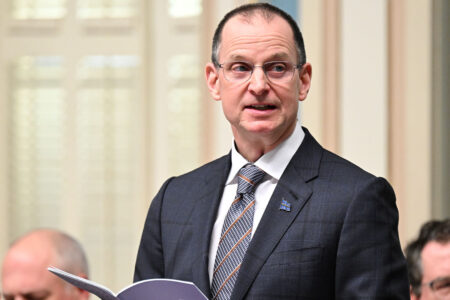
Support for electoral reform is a potent, if latent, political force in Canada, and Quebec now seems poised to switch its electoral system from single-member plurality (SMP) to mixed-member proportional representation (MMPR). Several factors strongly suggest that Premier François Legault’s government is serious about implementing a proportional system.
In last year’s provincial election, Legault’s party, the Coalition Avenir Québec (CAQ), clearly specified in its platform the system to which Quebec should switch — mixed-member proportional representation — instead of opting for the generic platitudes about “electoral reform” or “proportional representation.” Legault even pledged during the campaign not to “pull a Justin Trudeau” and abandon electoral reform if his party won a majority in the National Assembly.
After the CAQ won a parliamentary majority in October 2018, Legault reiterated his pledge in favour of MMPR specifically, during his Premier’s Opening Speech (Quebec’s equivalent of the Speech from the Throne). Legault clearly stated that his government would “table a bill to alter the electoral system in the first year of our mandate.” He further promised that the CAQ would seek “political consensus” within the National Assembly by “working in good faith with members from other parties.” But he also insisted that consensus among political parties in the elected assembly does not mean unanimity — a reasonable and wise distinction.
In January 2019, Minister of Justice Sonia LeBel pledged that the Legault government would introduce a bill to switch from SMP to MMPR by October 2019 at the latest. To that end, the government also authorized LeBel to consult with the Chief Electoral Officer and Élections Québec on the matter. LeBel announced in February that the government would allocate $225,000 over two years to a group called the Mouvement démocratie nouvelle so that it can promote MMPR. She reiterated the CAQ’s campaign promises not to hold a referendum. In April, Le Journal de Québec reported that the government’s concept for MMPR would keep the existing 125 seats in the National Assembly, with 74 single-member districts and 51 party-list seats, roughly a 60-40 split.
Since 2005, governments in British Columbia, Ontario and Prince Edward Island have explored proportional representation, but all ended up preserving the current system. They did so by using citizens’ assemblies as intermediaries and holding referendums that required extraordinary supermajorities for electoral reform (at least 60 percent instead of 50 percent plus one) instead of simply tabling legislation directly. All of these indirect methods undoubtedly decrease the probability that electoral reform will occur within a Westminster parliamentary system — a separate issue from the policy question of whether a province or country should switch electoral systems. Though 57.69 percent of British Columbians supported STV in 2005, they did not amount to the supermajority of 60 percent that the province’s government required. Majorities of British Columbians then voted against STV in 2009 and in 2018. Similarly, a majority of Ontarians rejected MMPR in the referendum of 2007. Prince Edward Island held a referendum in 2005 in which a majority rejected MMPR and a nonbinding plebiscite in 2016 in which a majority supported MMPR, but the Premier dismissed the 2016 result because of low voter turnout. Islanders voted in another referendum on switching to MMPR in conjunction with their general election on April 23 and rejected MMPR by a narrow margin.
In contrast, François Legault has clearly demonstrated that his government takes electoral reform seriously precisely because of what he did not promise to do: he did not say that the National Assembly would strike a special committee to study the issue of electoral reform, nor did he entertain establishing a citizens’ assembly on electoral reform, and then holding a referendum on whether the province should adopt the electoral system the citizens’ assembly recommends. In fact, during last year’s campaign, Legault expressly rejected holding a referendum on electoral reform, probably because referendums in that province evoke the spectre of secessionism, a political project that Legault has explicitly rejected in favour of autonomism and moderate nationalism.
The CAQ has a strong interest in implementing MMPR because it won a parliamentary majority in 2018 largely by chance with only 37.4 percent of the vote, after an unusual campaign in which four parties were competitive. It is unlikely that these conditions gagnantes will replicate themselves in subsequent elections. Switching from a majoritarian to a proportional system would help ensure the CAQ’s survival as a party in a province and political culture renowned for sudden and decisive shifts in the political landscape — and Quebec currently appears to be undergoing its most significant political realignment since the 1970s.
Ultimately, Legault’s approach to electoral reform — clearly specifying to which system the province should switch, campaigning on that policy and pledging to introduce a bill to implement it — best conforms to the principles and practices of responsible government and is greatly to his credit as a first minister. A provincial legislature alone can undoubtedly alter the province’s electoral system under the Constitution’s section 45 Amending Procedure. (Such changes would usually be made through amendments to the provincial Elections Act or equivalent statutes.)
Citizens’ assemblies and referendums merely provide political cover, and governments can decide whether to employ them or not; governments are not legally or constitutionally required to act on their results. If a provincial government truly believes in switching from a majoritarian to a proportional electoral system, then its cabinet should take responsibility for implementing it fully. In the current National Assembly, three of the four parties (the governing CAQ, the confused and near-defunct Parti Québécois and the socialist-secessionist Québec solidaire) support electoral reform; only the Liberals, the official opposition, support SMP. If the Legault government follows through and tables its bill by October 2019, it should easily pass with a supermajority of assembly members, and Élections Québec would have ample time to prepare to conduct the next provincial general election, scheduled for 2022, under MMPR. Furthermore, adopting MMPR would make Quebec unique and could appeal to the autonomist impulse that Legault has thus far successfully channelled.
If Quebec switches from SMP to MMPR, this policy would reinvigorate similar efforts in the other provinces and in Ottawa. The rest of Canada should watch this debate with great interest.
Photo: Shutterstock, by CL-Medien.
Do you have something to say about the article you just read? Be part of the Policy Options discussion, and send in your own submission. Here is a link on how to do it. | Souhaitez-vous réagir à cet article ? Joignez-vous aux débats d’Options politiques et soumettez-nous votre texte en suivant ces directives.







